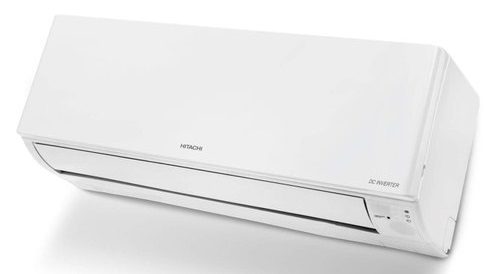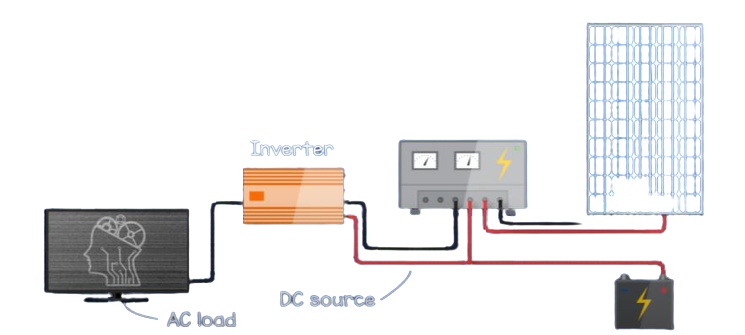What is a DC Inverter Air Conditioner?
What is the Working Principle of a DC inverter Air Conditioner?
How is a DC Inverter AC Different from Normal Air Conditioners?
Now that we are aware of how a DC inverter AC works, let us analyze how it is different from conventional air conditioners. The normal or regular AC units cannot produce variable levels of cooling. They do not have this feature. Hence, the compressor of the device runs either at full speed or remains turned off. The compressor turns on only when the temperature inside the room decreases or increases than the required degree.How Does a DC Inverter Air Conditioner save Electricity?
The upsides of using a DC inverter air conditioning unit are that it is environmental-friendly and consumes less power. You may ask us how is it possible to save the electricity when the compressor keeps running all through the time. Well, here is the answer to your question.What are the Differences Between DC Inverter ACs and Non-inverter ACs?
Let us explore the key differences between the DC inverter air conditioner and the non-inverter AC units. This will help you gain complete insights into why the inverter AC is the most preferred.DC Inverter ACs vs. Non-inverter ACs
| Characteristic Features | DC Inverter Air Conditioners | Non-Inverter Air Conditioners |
| Eco-friendly | The air conditioners with DC inverter technology are very eco-friendly in nature. Moreover, they use environment-friendly gases that are safe for the ozone layer. | The conventional air conditioning units are not eco-friendly. |
| Energy Efficiency | The DC inverter ACs have high energy efficiency. They consume less power than non-inverter ACs. | The non-inverter AC units consume more power irrespective of the temperature required. |
| Start/stop cycles | The compressors of the DC inverter ACs do not have a start or stop cycles. The compressor runs continuously at variable speeds. | Contrary to the DC inverter ACs, the non-inverter AC units have start or stop cycles. The compressor starts and runs to attain the required temperature. Once the room reaches the ambient temperature, the compressor turns off. It is a continuous process. |
| Speed Operation | The inverter AC cools or heats the room quickly than the non-inverter AC unit. | The air conditioner without inverter technology takes more time to cool or heat the room. |
| Uniform heating/cooling | The compressor of the inverter AC unit runs at variable speeds to maintain a steady temperature throughout. | The compressor of the non-inverter AC runs at full capacity to maintain a consistent temperature. Furthermore, it adds to your electricity bills getting heavy on your wallet. |
| Silent Operation | The inverter AC tends to be quiet when operating. | The non-inverter AC makes a loud noise when it operates. |
| Power Fluctuations | The DC inverter air conditioners do not put any extra load on the power circuit. Hence, they minimize the chances of power fluctuations. | The non-inverter AC units cause power fluctuations. |
| Compatibility | The DC inverter air conditioners are compatible with solar panels and UPS. You can run your ACs on these devices. | You cannot run your non-inverter ACs on solar power or UPS. |
| Smart Technology | These appliances are smart ACs that allow the user to have full control over the energy utilization. | These non-inverter appliances do not allow the user to have full control over the energy utilization. |
| Cost-effective | The DC inverter AC units are very cost-effective in the long run. | Although these appliances are less expensive than their inverter counterparts, they increase your electricity bills. They can be expensive in the future. |
What are the Advantages and Disadvantages of DC Inverter Air Conditioner?
Although the inverter technology in air conditioners offers many benefits, there are some limitations to it. Let us learn about the merits and demerits of the DC inverter AC units below:Advantages of a DC inverter Air Conditioner:
- The DC inverter air conditioners have high energy efficiency.
- Unlike the conventional ACs, these AC units do not have start/stop cycles.
- The DC inverter air conditioners have low operational costs.
- These devices help in maintaining consistent ambient temperature throughout.
- These AC units tend to make less noise when operating.
- The DC inverter air conditioners do not put any extra load on the power circuit. Hence, they minimize the chances of power fluctuations.
- Since the inverter AC units do not cause any voltage fluctuations, they help in safeguarding other electrical components.
- The air conditioners with inverter technology are eco-friendly because they use environment-friendly gases that are safe for the ozone layer.
- These appliances consume less electricity than conventional AC units.
- The DC inverter air conditioners are compatible with solar panels and UPS. They can run on these devices.
- The inverter ACs work effectively even at low voltages.
Disadvantages of a DC Inverter Air Conditioner:
- The DC inverter air conditioners are comparatively very expensive than the normal ACs.
- These air conditioning units are difficult to repair, as they have complex built-in circuits.
- They have high maintenance costs as the spare parts of these units are expensive.
- The DC inverter ACs require professionals to repair them. Not all local service technicians are skilled enough for the same.
- The DC inverter air conditioning units use refrigerant gases that are not easily accessible.
Frequently Asked Questions:
Ans: Unlike the conventional air conditioners, the DC inverter AC compressors do not turn on and off every time. Moreover, they do not even run at full capacity all the time. As a result, they consume less power, and further help save your electricity and even utility bills.
Ans: Yes, you can leave your inverter AC all the time. When you do so, your AC compressor need not work hard to maintain a consistent temperature. Similarly, when you switch it off and turn it on again, the unit consumes more electricity to produce the required cooling or heating effect.
Ans: Frankly speaking, you do not need a stabilizer when you are using an air conditioner with inverter technology. This is because there are no voltage fluctuations. Even if there is any, it is very minimal. However, if you connect your DC inverter AC unit to a stabilizer, you will have an additional layer of security to your appliance.
Ans: Yes. You can run your inverter air conditioners on UPS. However, there are certain things you need to keep in your mind before you do it. Ensure that there is no additional load on your UPS. In case of any overload, the UPS will shut down automatically.
Ans: The answer to this question is entirely dependent on the ambient temperature. For example, during summers, you can run your AC unit for about eight hours.
Conclusion:
The DC inverter air conditioners are highly energy-efficient appliances. Not only do they consume less power, but also help you save on your utility bills. Although they are a little expensive, they are very cost-effective in the long run. And the best part, they are environmental-friendly because they use gases that do not cause any harm to the ozone layer.
The key differences between inverter ACs and non-inverter ACs highlighted in this article should give you a complete understanding of why they are the best. The DC inverter air conditioners are a wise investment and worth your money. That means you can save on your electricity bills in the long run. However, it is up to the individual to take the call.
Let us know in the comments below if you find this article insightful and informative. Write to us if you have any questions or need more information on DC inverter ACs. We will try our best to answer all your queries at the earliest.
Do not hesitate to share your suggestions with us. Please feel free to let us know if we missed out on any points. If you have any inputs to add, mention them in the comments.
We would love to hear and learn from you.
Stay healthy and stay safe!!!



